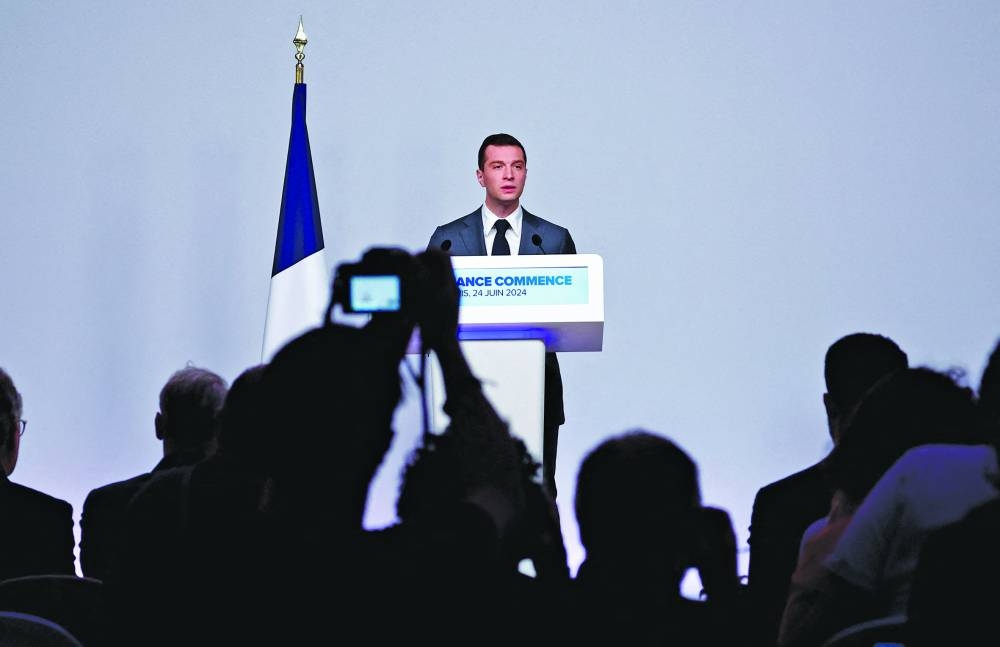France’s far-right leader Jordan Bardella yesterday sought to reassure European allies over his commitment to Ukraine and readiness to stand up to Russia if he became prime minister, but made clear where his government’s support for Kyiv would stop.
Bardella’s National Rally (RN) party, which opponents accuse of being too soft on Russia, looks set to win the most votes in snap parliamentary elections coming up on June 30 and July 7 and could form France’s next government.
That has raised concerns in Kyiv and other European capitals that France’s support for Ukraine — steadfast under President Emmanuel Macron — could weaken given conflicting signals National Rally has been sending since Russia invaded Ukraine in 2022.
In recent months, Macron’s government has sent long-range missiles that can reach Russian territory, promised warplanes and called for European countries to send military personnel to Ukraine to train its troops.
“I do not intend to call into question the commitments made by France on the international scene and harm our credibility at a time of war at Europe’s door,” Bardella said.
But unlike Macron, who has been ambiguous on how far Paris could go in its commitment to Ukraine, Bardella said there was a line his government would not cross.
“While I’m in favour of continuing to support Ukraine with logistics and defence equipment, my red line remains long-range missiles or any military equipment that could lead to escalation, by which I mean anything that could directly hit Russian cities,” he said. Sending French troops to Ukraine would also be off limits, he said. While Macron would remain in charge of defence and foreign policy even with RN in power, he would need parliament’s backing to finance any aid to Ukraine in the next budget due in autumn. RN could also block or delay any future weapons transfers because they need approval from the prime minister and the relevant ministers.
As part of its 10-year security guarantee pact with Ukraine agreed in March, Paris said it would provide up to 3bn ($3.2bn) in military aid to Ukraine in 2024, but that pact was not ratified by parliament.
Separately, speaking alongside his German and Polish counterparts in Paris, Defence Minister Sebastien Lecornu said the RN had repeatedly changed its stance on Ukraine to the point of contradicting itself and what Bardella said about defensive assistance could be open to interpretation.
“It needs clarity. If the RN is changing its opinion on Ukraine, then do it now,” said Lecornu.
He said delivering long-range missiles or howitzers was the least France could do for Ukraine to protect its own security in the face of the danger Russia presented.
Bardella last week backtracked on a promise to leave Nato’s integrated military command saying it was unthinkable while Europe was at war.
His party’s stance towards Russia is under scrutiny because its likely candidate at the next presidential election and former far-right leader, Marine Le Pen, has in the past expressed her admiration of President Vladimir Putin.
Moscow has long courted leaders on Europe’s political far-right and is keen to exploit any signs of division in Europe that could weaken support for Ukraine.
Macron, whose centrist party was trounced by the RN in European elections two weeks ago, accuses the party of reliance on Moscow, which makes it incapable of defending France’s interests.
Bardella, however, yesterday acknowledged Russia was a threat.
“I see Russia as a multi-dimensional threat both for France and Europe,” Bardella said. “Russia is challenging French interests today. It has been doing so for months, for years in our historical sphere of influence in Africa, in the Black Sea and in our overseas territories,” he said.
“I will be extremely vigilant to any attempted interference by Russia but also by any other states or powers in the world.”

Jordan Bardella, President of the French far-right Rassemblement National (RN) party, during a press conference to present policy priorities as part of the campaign for the upcoming French parliamentary elections, in Paris, yesterday. (Reuters)
